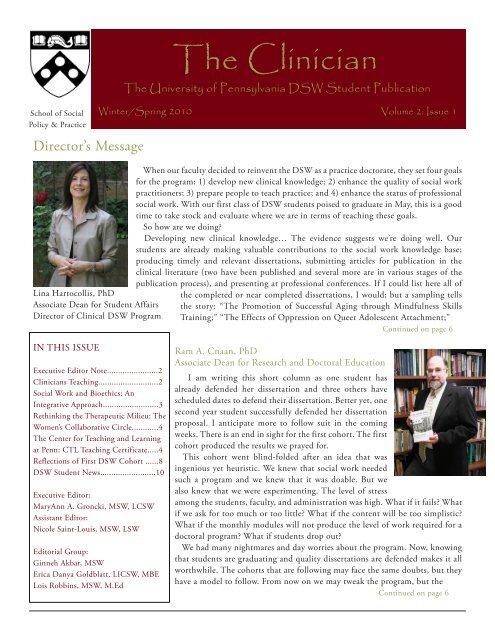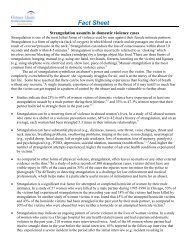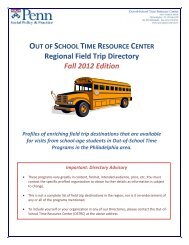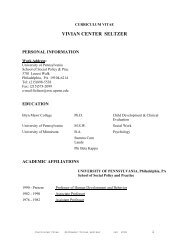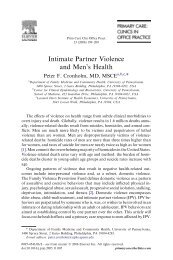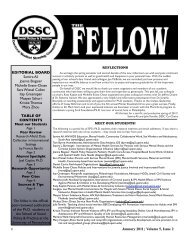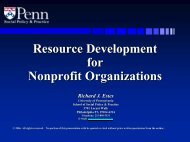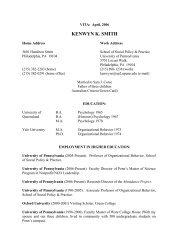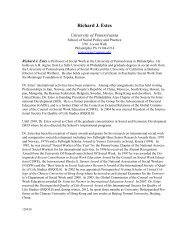Volume Two: Issue One - University of Pennsylvania School of ...
Volume Two: Issue One - University of Pennsylvania School of ...
Volume Two: Issue One - University of Pennsylvania School of ...
You also want an ePaper? Increase the reach of your titles
YUMPU automatically turns print PDFs into web optimized ePapers that Google loves.
<strong>School</strong> <strong>of</strong> Social<br />
Policy & Practice<br />
Director’s Message<br />
Lina Hartocollis, PhD<br />
Associate Dean for Student Affairs<br />
Director <strong>of</strong> Clinical DSW Program<br />
IN THIS ISSUE<br />
The Clinician<br />
The <strong>University</strong> <strong>of</strong> <strong>Pennsylvania</strong> DSW Student Publication<br />
Winter/Spring 2010 <strong>Volume</strong> 2: <strong>Issue</strong> 1<br />
Executive Editor Note.......................2<br />
Clinicians Teaching...........................2<br />
Social Work and Bioethics: An<br />
Integrative Approach.........................3<br />
Rethinking the Therapeutic Milieu: The<br />
Women’s Collaborative Circle............4<br />
The Center for Teaching and Learning<br />
at Penn: CTL Teaching Certificate.....4<br />
Reflections <strong>of</strong> First DSW Cohort ......8<br />
DSW Student News.........................10<br />
Executive Editor:<br />
MaryAnn A. Groncki, MSW, LCSW<br />
Assistant Editor:<br />
Nicole Saint-Louis, MSW, LSW<br />
Editorial Group:<br />
Ginneh Akbar, MSW<br />
Erica Danya Goldblatt, LICSW, MBE<br />
Lois Robbins, MSW, M.Ed<br />
When our faculty decided to reinvent the DSW as a practice doctorate, they set four goals<br />
for the program: 1) develop new clinical knowledge; 2) enhance the quality <strong>of</strong> social work<br />
practitioners; 3) prepare people to teach practice; and 4) enhance the status <strong>of</strong> pr<strong>of</strong>essional<br />
social work. With our first class <strong>of</strong> DSW students poised to graduate in May, this is a good<br />
time to take stock and evaluate where we are in terms <strong>of</strong> reaching these goals.<br />
So how are we doing?<br />
Developing new clinical knowledge… The evidence suggests we’re doing well. Our<br />
students are already making valuable contributions to the social work knowledge base;<br />
producing timely and relevant dissertations, submitting articles for publication in the<br />
clinical literature (two have been published and several more are in various stages <strong>of</strong> the<br />
publication process), and presenting at pr<strong>of</strong>essional conferences. If I could list here all <strong>of</strong><br />
the completed or near completed dissertations, I would; but a sampling tells<br />
the story: “The Promotion <strong>of</strong> Successful Aging through Mindfulness Skills<br />
Training;” “The Effects <strong>of</strong> Oppression on Queer Adolescent Attachment;”<br />
Continued on page 6<br />
Ram A. Cnaan, PhD<br />
Associate Dean for Research and Doctoral Education<br />
I am writing this short column as one student has<br />
already defended her dissertation and three others have<br />
scheduled dates to defend their dissertation. Better yet, one<br />
second year student successfully defended her dissertation<br />
proposal. I anticipate more to follow suit in the coming<br />
weeks. There is an end in sight for the first cohort. The first<br />
cohort produced the results we prayed for.<br />
This cohort went blind-folded after an idea that was<br />
ingenious yet heuristic. We knew that social work needed<br />
such a program and we knew that it was doable. But we<br />
also knew that we were experimenting. The level <strong>of</strong> stress<br />
among the students, faculty, and administration was high. What if it fails? What<br />
if we ask for too much or too little? What if the content will be too simplistic?<br />
What if the monthly modules will not produce the level <strong>of</strong> work required for a<br />
doctoral program? What if students drop out?<br />
We had many nightmares and day worries about the program. Now, knowing<br />
that students are graduating and quality dissertations are defended makes it all<br />
worthwhile. The cohorts that are following may face the same doubts, but they<br />
have a model to follow. From now on we may tweak the program, but the<br />
Continued on page 6
Executive Editor Note<br />
MaryAnn A. Groncki, MSW, LCSW<br />
Doctoral Candidate<br />
On a warm and sunny afternoon in September, 2007, I walked into the first class <strong>of</strong><br />
the DSW program unsure <strong>of</strong> what to expect for the next three years. I was filled with<br />
an excitement that I’m sure I could not hide from my cohort mates. I could have never<br />
imagined that the next three years would bring with it so many wonderful educational,<br />
extracurricular, and interpersonal experiences.<br />
<strong>One</strong> <strong>of</strong> those exciting and enriching experiences was the creation and publication <strong>of</strong> our<br />
student-run newsletter, The Clinician. I remember the discussions with my cohort regarding<br />
the need for a venue that would display the clinical and academic accomplishments <strong>of</strong> the Clinical Doctor <strong>of</strong> Social<br />
Work students. They agreed, an idea was born, and as you can see our efforts were realized beyond our wildest dreams.<br />
The overall vision for The Clinician was to provide the vehicle for DSW students to highlight our academic and<br />
pr<strong>of</strong>essional achievements as advanced students and established clinicians in the field <strong>of</strong> clinical social work. Most<br />
importantly, it was our hope that the newsletter would become a source <strong>of</strong> pride and a unifying factor for the DSW<br />
student body. I can say with great pride that we have accomplished meeting that vision because <strong>of</strong> the combined efforts<br />
<strong>of</strong> the now three DSW cohorts.<br />
As my time as Executive Editor is approaching an end, I have been reflecting on the past while also looking forward<br />
to the future. I leave my cohort’s legacy, this newsletter, in capable hands. This upcoming May, Ginneh Akbar will<br />
become the next Executive Editor and Erica Danya Goldblatt will become the next Assistant Editor <strong>of</strong> The Clinician.<br />
I am confident that Ginneh and Erica will continue to build upon the established foundation and take the newsletter<br />
to the next level.<br />
I would like to take this opportunity to say that it has been an honor and privilege to have been the Executive Editor<br />
<strong>of</strong> The Clinician. I would like to thank Dr. Lina Hartocollis for her continuing support <strong>of</strong> our newsletter. Thank you<br />
also to Dr. Ram Cnaan for his willingness to contribute to each edition <strong>of</strong> our newsletter. To the Assistant Editor (and<br />
my cohort mate), Nicole Saint-Louis, I send many thanks. I cannot thank her enough for her willingness to join with<br />
me on working on the newsletter. Thank you also to the Editorial Group - Ginneh, Erica, and Lois - for their dedication<br />
and hard work. Thank you to Angel Hogan for her consistent help. To all who have contributed articles for publication<br />
in the newsletter, thank you! Finally, I would like to thank my cohort, the graduating Clinical Doctor <strong>of</strong> Social Work<br />
class <strong>of</strong> 2010. The Clinician would not have been a reality without your encouragement and support. I’m looking<br />
forward to walking down Locust Walk with you on May 17th, 2010!<br />
Clinicians Teaching<br />
Danna Bodenheimer, MSW, LSW<br />
Doctoral Candidate<br />
I am a member <strong>of</strong> the first DSW cohort <strong>of</strong> this clinical program. This upcoming May, we will be the first graduating<br />
Clinical Doctor <strong>of</strong> Social Work cohort. It is a tremendous academic achievement and also speaks to the tenacity <strong>of</strong> this<br />
cohort. This group that I am a part <strong>of</strong> is nothing short <strong>of</strong> impressive. I don’t mean to toot my own horn, but I think<br />
it valuable to point out the amazing strength <strong>of</strong> these graduating clinicians. All <strong>of</strong> the members <strong>of</strong> this program are<br />
either in leadership positions within agencies, hospitals or universities or are managing full-time private practices. The<br />
reciprocity that has occurred between the pr<strong>of</strong>essionals in these diverse settings and the classroom created a constant,<br />
thriving dialogue about the field <strong>of</strong> Social Work and the impact that we want to have on it as a whole.<br />
It seems that there has been a shared sense <strong>of</strong> curiosity and mystification about how we, as clinicians, can become a<br />
stable part <strong>of</strong> the academy. While this curiosity may seem selfishly driven by our desire to find doctoral level jobs, I have<br />
witnessed another side <strong>of</strong> this search. For however eager we have been to identify our role in academic settings, MSW<br />
students seem congruently eager to have practitioners educating them.<br />
Continued on page 2<br />
Page 2 The Clinician - Winter/Spring 2010
Clinicians Teaching<br />
Continued on page 2<br />
As an adjunct faculty member and a private practice clinician, I find the symbiosis between these two positions<br />
is personally fulfilling and pr<strong>of</strong>essionally inspiring. The issue, unfortunately, is that to truly be immersed in either<br />
practice or academia it is nearly impossible to not sacrifice one for the other. The pressures <strong>of</strong> tenure track positions<br />
make attending to a full practice untenable. While, on the other hand, the multiple elements <strong>of</strong> sustaining a successful<br />
full-time clinical job or private practice and teaching can be a surefire route towards pr<strong>of</strong>essional burnout.<br />
My cohort recently had a class with Dr. Nancy McWilliams, the author <strong>of</strong> the beloved Psychoanalytic Diagnosis.<br />
She explained her unique role at Rutgers <strong>University</strong>’s Psy.D. program. Beginning in 1981 the school recognized a need<br />
for the sharing <strong>of</strong> practice wisdom and experience with the student body. They became invested in filling this need<br />
through the creation <strong>of</strong> a “visiting scholar” program. This means that Dr. McWilliams is able to work at the <strong>University</strong>,<br />
consistently, for one day a week. She has remained a “visiting” scholar for the past 28 years while able to maintain a<br />
commitment to writing and her private practice work. Her role at the <strong>University</strong> is secure and consistent.<br />
This type <strong>of</strong> stability within the <strong>University</strong> setting is unique without the tenure track security. While adjunct faculty<br />
positions lend us temporary access to Universities, we cannot establish a reliable voice and presence over time in this<br />
capacity. The students <strong>of</strong> the DSW program, as a whole, would love to see some sort <strong>of</strong> middle ground that speaks to<br />
the need for clinical savvy as a teaching value in MSW programs. As pr<strong>of</strong>essionals we have something valuable to share<br />
and our students know it.<br />
I am writing to encourage you to join in the effort to build sustainable relationships between local MSW programs<br />
and clinicians. We are operating in a locale that is perfect to begin this effort. We have excellent MSW programs, eager<br />
students, and a city that requires the highest level <strong>of</strong> effective clinical social work. A first step might be to collectively<br />
lobby the Deans <strong>of</strong> local schools (including this one) to take us seriously as potential faculty. This would require a<br />
surrendering <strong>of</strong> a singular focus on research in favor <strong>of</strong> broadening understanding <strong>of</strong> what renders a social worker<br />
“qualified” to teach. Another step is by introducing Continuing Education Programs, co-created between the DSW<br />
students and local Universities. The possibilities for building this academic-clinical coalition are multiple and exciting.<br />
And, relationship building is certainly our forte.<br />
I encourage you to teach and to begin to inundate our Universities with the talent that defines our clinical work. I<br />
also encourage you to organize, with me, in whatever capacity feels appropriate to render this possible.<br />
A special thank you to The <strong>Pennsylvania</strong> Society for Clinical Social Work (PSCSW) for giving us permission to revise<br />
and reprint this article in The Clinician. The original article was published in the Fall, 2009 edition <strong>of</strong> The Clinical<br />
Voice, the PSCSW newsletter.<br />
Social Work and Bioethics: An Integrative Approach<br />
Erica Danya Goldblatt, MSW, MBE<br />
2nd Year DSW Student<br />
Bioethics may be defined as the study <strong>of</strong> ethical controversies that arise due to increasing advances in the medical<br />
field (Jonson, 1998). My own bioethics consultation experience is limited to practice in hospital settings. Throughout<br />
my experience in clinical ethics, my social work skills have proven invaluable. The skills so useful in social work<br />
practice also assist me in clinical bioethics consultation. Just as a doctor on the consultation team brings his knowledge<br />
<strong>of</strong> medicine to the service, I employ my expertise in social work to help analyze a complex case.<br />
During the ethics consultation process, while acknowledging ethical theory and the importance <strong>of</strong> autonomy,<br />
beneficence, justice, and nonmaleficence (Beauchamp & Childress, 2001), I employ the following social work skills:<br />
Be culturally competent. Patients are diverse. Some populations may be more skeptical <strong>of</strong> institutional medical<br />
interventions. For example, the infamous forty-year Tuskegee Syphilis Study reflects an example <strong>of</strong> how African<br />
Continued on page 7<br />
The Clinician - Winter/Spring 2010 Page 3
Rethinking the Therapeutic Milieu: The Women’s Collaborative Circle<br />
Carly Goldberg, MSW, LCSW<br />
1st Year DSW Student<br />
After reading about the Congressional debate on health care reform, I was struck by the discussions regarding<br />
women’s health. Some would argue that we live in a post-feminist era and need not be concerned with or pay<br />
attention to women’s rights. However, women continue to be shaped by the decisions and laws that are influenced by<br />
a male-oriented culture. The decisions and laws <strong>of</strong>ten perpetuate women’s silent feelings <strong>of</strong> inadequacy, shame, fear,<br />
ambivalence, and failure.<br />
The Women’s Liberation Movement <strong>of</strong> the 1960’s recognized this paradigm and led Carol Hanisch to pen the popular<br />
adage “the personal is political” in her 1969 essay <strong>of</strong> the same name. Hanisch speaks about the act <strong>of</strong> consciousnessraising,<br />
not as therapy, but as a means to inform women that their personal problems are political. While this sentiment<br />
helps us understand how the larger community that we live in impacts our daily actions and inner-selves, without<br />
addressing the personal there exists no good way to work through the effects <strong>of</strong> the political.<br />
As a social worker and a woman, I felt driven to organize a place that women could freely share and receive feedback<br />
from one another. The creation <strong>of</strong> the Women’s Collaborative Circle was heavily influenced by the spirit <strong>of</strong> feminism<br />
along with psychodynamic theories and social work core values. My belief is that women are in need <strong>of</strong> a safe space that<br />
empowers them to explore different methods <strong>of</strong> self-care. The Women’s Collaborative Circle seeks to provide, support<br />
and exchange information. Through personal and collective empowerment there is the ability to create change. It is<br />
my hope that women from all walks <strong>of</strong> life will collaborate and utilize this and other social networking technologies<br />
to speak their mind and in turn have their voices heard.<br />
The Center for Teaching and Learning at Penn:<br />
CTL Teaching Certificate<br />
Rosemary Frasso, MS, MSPH, CPH<br />
Doctoral Candidate<br />
Graduate Teaching Fellow - Center for Teaching & Learning<br />
The Center for Teaching and Learning at Penn helps standing faculty, adjunct faculty and doctoral students serving<br />
as TAs or lecturers develop and improve their teaching. It promotes valuable conversations about teaching among<br />
those groups as a way to enhance the quality <strong>of</strong> education at Penn. By fostering discussions about teaching, CTL<br />
encourages instructors to reflect on their own practices, to gain new insights, and to learn new ideas and strategies<br />
from each other.<br />
CTL’s competitive Graduate Fellowship for Teaching Excellence recognizes graduate students who share the Center’s<br />
interest in pedagogy. The CTL fellows organize and lead informal discussions on teaching-related topics. Additionally,<br />
the fellows serve as resources for PhD and DSW students on teaching issues. Each fellow organizes a series <strong>of</strong> CTL<br />
workshops within their departments. These workshops focus on the needs <strong>of</strong> students who are TAing, teaching or<br />
planning to teach in the future. The goal is to foster discussions between faculty and students about teaching and to<br />
help doctoral students develop their teaching skills.<br />
As many <strong>of</strong> you know I am a PhD candidate in SP2 and one <strong>of</strong> this year’s teaching fellows. I am coordinating a series<br />
<strong>of</strong> teaching workshops in our department. Additionally, I will serve as a resource to both DSW and PhD students who<br />
are teaching/TAing now or planning to do so in the future. I can be reached via email at r<strong>of</strong>rasso@sp2.upenn.edu and<br />
by phone at 215-898-2506.<br />
CTL also <strong>of</strong>fers graduate students at Penn the CTL Teaching Certificate, which indicates a graduate student’s interest<br />
in teaching beyond what is required by their department. Graduate students who wish to earn the certificate take part<br />
in a series <strong>of</strong> workshops and formal conversations about teaching. In addition, they reflect on their own<br />
Page 4 The Clinician - Winter/Spring 2010<br />
Continued on page 6
DSW Holiday Party<br />
December, 2009<br />
DSW Class <strong>of</strong> 2010<br />
Left to Right:<br />
Margaret Preston, Kielty Turner, Nicole Saint-Louis,<br />
Tracy Griffith, Cynthia Closs, Danna Bodenheimer,<br />
Laura Kotler-Klein, Jack Lewis, Lloyd Gestoso,<br />
Jane Abrams, Eric Stein, Heather Sheaffer,<br />
MaryAnn Groncki & Valerie Allen<br />
Work published in The Clinician is not copyrighted by the newsletter. Publication in The Clinician does not limit the<br />
publication <strong>of</strong> work submitted and published in the newsletter in other venues. Opinions and ideas expressed by the<br />
contributors are their own and not necessarily those <strong>of</strong> The Clinician editorial group, the <strong>School</strong> <strong>of</strong> Social Policy &<br />
Practice, or the <strong>University</strong> <strong>of</strong> <strong>Pennsylvania</strong>. Submissions may have been edited to conform to newsletter styles and<br />
formats.<br />
The Clinician - Winter/Spring 2010 Page 5
The Center for Teaching and Learning at Penn: CTL Teaching Certificate<br />
Continued from page 4<br />
teaching with a fellow from the Center for Teaching and Learning who has observed them in the classroom. The<br />
certificate contains four components.<br />
1.) Pedagogical Discussion and Training: Participants must complete five CTL-approved teaching workshops. CTLapproved<br />
semester-long programs may be substituted for three <strong>of</strong> the five training workshops. Training workshops are<br />
organized by fellows across the university. Students are invited and encouraged to attend workshops organized by CTL<br />
fellows in any department as well as university wide workshops held in the CTL. See the CTL webpage for schedules<br />
and details (www.sas.upenn.edu/ctl/grad/grad_workshops.html).<br />
2.) Teaching Experience: Participants must complete at least two semesters as a teaching assistant or instructor.<br />
3.) Observation and Review: Participants must have a full teaching session observed and reviewed by a member <strong>of</strong> the<br />
CTL staff.<br />
4.) Teaching Philosophy: Participants must develop a statement <strong>of</strong> teaching philosophy and discuss it in a CTL session<br />
culminating the certificate program. We hold three <strong>of</strong> these sessions a year. <strong>One</strong> takes place in the middle <strong>of</strong> the<br />
Fall semester and another two sessions take place in the Spring semester. Once a participant has completed all the<br />
requirements, he or she will be invited to the workshop.<br />
There will be four CTL workshops held in SP2 this spring and a host <strong>of</strong> others across the university. Please visit the<br />
CTL web site for more information http://www.sas.upenn.edu/ctl/.<br />
Ram A. Cnaan, PhD<br />
Associate Dean for Research and Doctoral Education<br />
Continued from page 1<br />
basic design is in motion. Future cohorts will have to look at the cohorts ahead <strong>of</strong> them and say: “No reason to panic;<br />
if they did it, so will we.”<br />
Dr. Lina Hartocollis and the advisory board <strong>of</strong> the program deserve special thanks for making it happen. The amount<br />
<strong>of</strong> work that Lina put into the program and her vision as to how to make it real was amazing. She gave her heart<br />
and soul to make the DSW a reality. She came up with the idea <strong>of</strong> the monthly modules and carefully selected the<br />
instructors. The fact that many, if not all, <strong>of</strong> the first cohort will walk in May graduation is in large part due to Lina’s<br />
hard work. On my behalf, and I am sure that on behalf <strong>of</strong> all <strong>of</strong> you, I want to thank her for carrying the program on<br />
her shoulders. I also want to thank Angel for being there for all <strong>of</strong> us and truly caring for the success <strong>of</strong> the program<br />
and each student’s success.<br />
As for myself, I enjoyed working with the first cohort on their dissertations. At times, I was more <strong>of</strong> a group therapist<br />
than a pr<strong>of</strong>essor but it was part <strong>of</strong> our joint learning and growth. I learned new social work theories and areas <strong>of</strong><br />
practice, but most <strong>of</strong> all I felt that I am helping social work knowledge to be generated. And generating new social work<br />
knowledge and helping new pr<strong>of</strong>essional leaders to emerge were and are my main reasons for wanting the program.<br />
The experience was so good that I plan to repeat it in the near future. And I believe that this is the best testimony that<br />
together, we made it.<br />
Director’s Message<br />
Continued from page 1<br />
“Educational Entertainment as an Intervention with Black Adolescents Exposed to Community Violence;” “A<br />
Comparative Study <strong>of</strong> Adopted and Nonadopted Women’s Attachment within Romantic Relationships;” and “The<br />
Unmet Needs <strong>of</strong> Family Members <strong>of</strong> Patients in the ICU and Implications for Social Work Practice”.<br />
Enhancing the quality <strong>of</strong> social work practitioners… Preliminary feedback from student evaluations <strong>of</strong> courses,<br />
instructor evaluations <strong>of</strong> students, and informal student and faculty reviews indicates that we are also in good shape<br />
with regard to this second goal. Intensive coursework taught by renowned faculty from across the country<br />
Continued on page 7<br />
Page 6 The Clinician - Winter/Spring 2010
Director’s Message<br />
Continued from page 6<br />
has immersed students in cutting edge knowledge about relational theory, CBT, psychodynamic diagnosis, trauma theory<br />
and interventions, organizational trauma, ethics and end <strong>of</strong> life care issues, and culturally sensitive clinical practice, to name<br />
but a few. As one student recently said, “I find myself thinking in a larger, out <strong>of</strong> the box way… it’s helped take me to a<br />
new level in my work.”<br />
Preparing practice pr<strong>of</strong>essors… Not everyone pursing the Clinical DSW wants to pursue a career in teaching and/or<br />
clinical research, but a majority <strong>of</strong> students currently in the program have expressed a desire to do some combination <strong>of</strong><br />
practice, teaching and clinical research when they graduate. In addition to the coursework on research and teaching, and<br />
the modeling <strong>of</strong> good teaching by DSW faculty, most <strong>of</strong> our graduating students have had at least one opportunity in the<br />
classroom as either a TA or instructor. <strong>One</strong> <strong>of</strong> these students has already been <strong>of</strong>fered a full-time faculty position at a local<br />
<strong>University</strong>.<br />
Enhancing the status <strong>of</strong> pr<strong>of</strong>essional social work… Though the jury’s still out on this one, we have a head start simply<br />
because the salutation “Doctor” in front <strong>of</strong> someone’s name confers status. So as Penn’s Doctors <strong>of</strong> Social Work begin<br />
to populate the practice world (perhaps joined in the not so distant future by social work doctors from other schools) it<br />
stands to reason that the pr<strong>of</strong>ession as a whole will experience a bump in status. This is all the more likely if the social work<br />
“Doctors” are as accomplished and impressive as Penn’s first graduating DSW class has proven themselves to be.<br />
Social Work and Bioethics: An Integrative Approach<br />
Continued from page 3<br />
Americans may be distrustful <strong>of</strong> institutional medicine and public health. However, Gamble (1997) argues that African<br />
Americans’ “fears about exploitation by the medical pr<strong>of</strong>ession date back to the antebellum period and the use <strong>of</strong> slaves and<br />
free black people as subjects for dissection and medical experimentation” (Gamble, 1997, 1773). The clinical ethicist and<br />
social worker must acknowledge the broader social and historical contextual factors that might influence the patient’s views<br />
about the care they are receiving.<br />
Don’t just treat the patient. The social worker’s role is to complete a biopsychosocial assessment. Furthermore, a clinical<br />
bioethicist should know what family support exists for the patient. How will both patient and family quality <strong>of</strong> life be<br />
affected by the decision being made? The definition <strong>of</strong> family is important to both social work and bioethics.<br />
Know your terminology. For example, in pediatrics, “assent” and “consent” are different, but important terms (Broome,<br />
1999). A child cannot consent to treatment but should understand the invasive measures doctors are enacting. The ethicist<br />
should be able to participate in this discussion with committee members on a high level, and family members on a lay level.<br />
Remember that you are making recommendations. Clinical ethicists carefully weigh all the options to provide treatment<br />
recommendations, not orders. The ruling <strong>of</strong> the ethics panel is not law but an important step in determining how to best<br />
treat the patient. The input <strong>of</strong> the ethics team is important but is not always followed.<br />
Think evidence-based. Read up on your population and seminal cases. Always support your decisions with research. Your<br />
ability to cite supporting literature in your recommendations adds fuel to your argument. Just as in social work, there are<br />
numerous perspectives. Be prepared to examine the issue from a variety <strong>of</strong> standpoints.<br />
Social work skills enhance bioethics practice. Social workers consider the entire experience <strong>of</strong> a patient and family in<br />
ethics consultation. While a Master <strong>of</strong> Bioethics degree provides a deeper understanding <strong>of</strong> the ethical theories needed to<br />
provide an informed recommendation, the skills learned in social work provide the baseline for communication and joining<br />
with patients, families, and interdisciplinary teams in a hospital environment.<br />
References<br />
Beauchamp, T. R., & Childress, J. F. (2001). Principles <strong>of</strong> biomedical ethics (5th ed.). New York: Oxford.<br />
Broome, M. E. (1999). Consent (assent) for research with pediatric patients. Seminars in Pediatric Nursing, 15(2), 96-103.<br />
Gamble, V. N. (1997). Under the shadow <strong>of</strong> tuskegee: African americans and health care. American Journal <strong>of</strong> Public Health,<br />
87(11), 1773-78.<br />
Jonson, A. R. (1998). The birth <strong>of</strong> bioethics. New York: Oxford.<br />
The Clinician - Winter/Spring 2010 Page 7
Reflections <strong>of</strong> the First DSW Cohort (2007-2010)<br />
In reflecting on my experiences as a member <strong>of</strong> the first cohort <strong>of</strong> the DSW program at SP2, I can report that I have<br />
fulfilled the personal goals that motivated me to embark on this endeavor. I have had the opportunity to revisit and<br />
study in depth the theories that have informed my clinical practice for the past 25 years. I have learned how to do<br />
scholarly research, write an article that applies theory to practice and have it published in a peer -reviewed journal.<br />
As I work on my dissertation, I am engaging in all aspects <strong>of</strong> executing a qualitative research study using grounded<br />
theory methodology. Moreover, I have become a more well rounded pr<strong>of</strong>essional in that I have a more comprehensive<br />
knowledge <strong>of</strong> my field and am a more educated consumer <strong>of</strong> relevant research. Perhaps most importantly, I have<br />
experienced unanticipated personal growth as I have taken on the myriad challenges <strong>of</strong> this program, and had the<br />
privilege <strong>of</strong> doing so with a cohort <strong>of</strong> exceptional colleagues.<br />
Jane Abrams<br />
Growth is what happens in the tension between what we don’t know and what we know (J. Fantuzzo). Being “between”<br />
is always hard. Not knowing how I fit in, not being confident in my ability to finish what I started and questioning if<br />
I made the right decisions all make me feel “between”. I have felt this tension quite a bit over the last 2 ½ years! If that<br />
is where growth is than I think I have grown a lot! I take with me more knowledge, additional friends & colleagues<br />
and a greater sense <strong>of</strong> my pr<strong>of</strong>essional self and personal fortitude. I am a Social Worker who has been shaped by the<br />
Master Potter to do a great work! I thank God for my family, friends, cohort, and pr<strong>of</strong>essors who God used to help<br />
give me a depth <strong>of</strong> understanding <strong>of</strong> who I am and why I am here.<br />
Valerie Allen<br />
When I entered the DSW program it was with the hope <strong>of</strong> deepening my clinical skills and enhancing my possibilities<br />
for teaching. What I didn’t expect was that I would fall in love. I have fallen in love with teaching. This is a direct<br />
result <strong>of</strong> the opportunities that SP2 has provided me these past few years. The support <strong>of</strong> my pr<strong>of</strong>essors, particularly<br />
Jeff, Ram, and Lina, is unparalleled by any <strong>University</strong>. Thank you to Kira and Nate, the loves <strong>of</strong> my life.<br />
Danna Bodenheimer<br />
My DSW experience can be described with one name: Ram Cnaan. Without his blunt feedback paired with constant<br />
encouragement and support, I would not have laughed as much or been so close to defending my dissertation. I am<br />
truly indebted and will forever feel honored, grateful, and thankful to have had him as my dissertation chair.<br />
Cynthia Closs<br />
Pure social work allows humanity to embrace its divine, yet broken nature, through unconditional relationship and<br />
community. The Doctor <strong>of</strong> Social Work is an attempt to identify the latest science, yet refuse to allow human beings<br />
to be limited by it. We are called to pursue justice and love, continually and simultaneously within individual, group,<br />
and community dynamics. May a holistic social work emerge that unites the clinician with the organizer to amplify<br />
justice and the dignity in all people. Thank you to my pr<strong>of</strong>essors, my sending university - PBU, my outstanding<br />
cohort friends, my children Zoe Mei and Elijah Li, my wife Amy who grants me grace and love, and Jesus who sustains<br />
me daily to be His servant.<br />
Lloyd Gestoso<br />
Throughout this DSW journey, I have experienced both personal and pr<strong>of</strong>essional growth. I consider it an honor to<br />
have had the opportunity to get to know and work together with each <strong>of</strong> my fellow DSW cohort mates. Because <strong>of</strong><br />
the guidance and support <strong>of</strong> my dissertation chair (Dr. Ram Cnaan), the dedication <strong>of</strong> the administration (led by Dr.<br />
Lina Hartocollis), and the enthusiasm <strong>of</strong> the pr<strong>of</strong>essors who have shared their expertise and vast knowledge base, I am<br />
confident that the next phase <strong>of</strong> my clinical social work career will be a pr<strong>of</strong>essionally and personally fulfilling one.<br />
MaryAnn A. Groncki<br />
Page 8 The Clinician - Winter/Spring 2010<br />
Continued on page 9
Reflections <strong>of</strong> the First DSW Cohort (2007-2010)<br />
Continued from page 8<br />
The DSW program has been meaningful for me both academically and in terms <strong>of</strong> personal achievement. Given the<br />
opportunity to study with experts in their fields as well as learning from the impressive cohort, I find that my inner<br />
(and hopefully external!) horizons have expanded. The DSW has been a further investment in the field that has<br />
deepened my appreciation for all the diverse aspects <strong>of</strong> social work.<br />
Laura Kotler-Klein<br />
In reflecting back upon my experiences in the DSW program my main take away has been that I truly learned how<br />
awesome God is. I honestly believe that without Him I could have never made it through this program. My second take<br />
away is that I am truly in awe <strong>of</strong> every single member <strong>of</strong> this cohort. Each <strong>of</strong> us are unique and talented pr<strong>of</strong>essional<br />
social workers and true trail-blazers. It has been a pleasure going through this experience with each <strong>of</strong> them.<br />
Jack B. Lewis, Jr.<br />
My experience in the DSW program was bittersweet. I learned about social work, more importantly, I learned about<br />
“social workers”. I learned that there is a camera above our mailboxes which monitors the activity below. As a social<br />
worker, I’d like to imagine what it would be like if there was a camera above our lives that monitored our interactions<br />
with our peers, our clients, and even ourselves. Some students believe that the title “Doctor” magically brings with<br />
it respect. I believe that respect comes from integrity, requiring no title for it to shine. My take away message: The<br />
integrity <strong>of</strong> the upright will guide them….. -Proverbs11:3<br />
Margaret Preston<br />
As we enter the final phase <strong>of</strong> this DSW program, I am filled with appreciation for the guidance and wisdom <strong>of</strong> Ram<br />
Cnaan my intrepid dissertation chair, for the tutelage <strong>of</strong> Jerri Bourjolly, the insights <strong>of</strong> Rita Charon at Columbia, for<br />
each <strong>of</strong> the distinguished pr<strong>of</strong>essors that shared their insights and experience, for the contributions <strong>of</strong> SP2 faculty and<br />
administration, especially Lina Hartocollis who worked tirelessly to assure the best possible educational experience, to<br />
Angel Hogan for her amazing support and kindness, and for each <strong>of</strong> my fellow cohort mates--it has been a privilege<br />
and an honor to share this DSW journey with you and lastly, to my incredible husband for his unconditional love,<br />
support and prayers.<br />
Nicole Saint-Louis<br />
It’s hard to reflect on my experience over the last three years without sounding too corny or sentimental but I will do<br />
so regardless! The DSW program has taught me that I have so much more to learn - my eyes have be reopened to the<br />
vastness <strong>of</strong> social work and the infinite knowledge yet to be discovered. I have learned that whether we call someone<br />
a patient or a client, there is so much we can learn from one another if we are open to that learning. I learned that<br />
I, and my cohort-mates, are capable accomplishing feats we never imagined possible like working 50+ hours a week<br />
while taking classes and writing a dissertation. And finally, I learned that graduating with the DSW isn’t the end <strong>of</strong> a<br />
journey but merely the beginning.<br />
Heather Sheaffer<br />
The DSW program has been one <strong>of</strong> the richest and most rewarding learning experiences. Penn faculty and visiting<br />
faculty have been masterful in their ability to articulate their areas <strong>of</strong> expertise, to provide powerful case examples<br />
and respond sagely to cohort member case presentations, and to <strong>of</strong>fer deep insights into issues related to social work<br />
practice and social change. Cohort members have been brilliant, engaging, supportive, challenging, open-minded,<br />
willing to take risks, and friendly. I am so happy to have been a part <strong>of</strong> the program and am ecstatic that this kind <strong>of</strong><br />
academic experience exists for seasoned social work pr<strong>of</strong>essionals. The field <strong>of</strong> social work is better for it.<br />
Eric Stein<br />
Continued on page 10<br />
The Clinician - Winter/Spring 2010 Page 9
Reflections <strong>of</strong> the First DSW Cohort (2007-2010)<br />
Continued from page 9<br />
Penn’s DSW program has provided me with the scholarly foundation to take my clinical expertise to the next level. My<br />
cohort and the pr<strong>of</strong>essors have challenged me, broadening my understanding <strong>of</strong> social work as an art and a science. All<br />
<strong>of</strong> these experiences will inform and enrich my work as an educator <strong>of</strong> future social workers.<br />
Kielty Turner<br />
DSW Student News<br />
Guia Calicdan-Apostle, MSSW, Cert. in <strong>School</strong> Social Work - second year student - presented a paper on “Spirituality<br />
and Religion in Psychotherapy”, at the 2009 Mid-Atlantic Regional Meeting <strong>of</strong> the Society for Psychotherapy Research<br />
conference at the <strong>University</strong> <strong>of</strong> <strong>Pennsylvania</strong> Medical Center. Guia proposed a study on religious motivation and the<br />
use <strong>of</strong> spiritually-motivated interventions by mental health practitioners who belong to a lesser known religion, The<br />
Baha’i Faith.<br />
Cynthia Closs, LCSW – doctoral candidate - is a co-instructor for the Mental Health Diagnosis class at the <strong>University</strong><br />
<strong>of</strong> <strong>Pennsylvania</strong> <strong>School</strong> <strong>of</strong> Social Policy and Practice.<br />
Michael M. Crocker, MA, LCSW – first year student - is teaching a course on Process Addictions for the Gay and<br />
Lesbian Affirmative Psychotherapy Program which is a division <strong>of</strong> the Institute for Contemporary Psychotherapy<br />
in New York City. The course focuses on the assessment and treatment <strong>of</strong> process addictions which includes sexual<br />
compulsivity as well as other behavioral forms <strong>of</strong> addictive acting out.<br />
Lloyd Gestoso, MSW – doctoral candidate – is facilitating the CSWE reaffirmation self-study process for the Bachelor<br />
<strong>of</strong> Social Work Program at Philadelphia Biblical <strong>University</strong>.<br />
Erica Goldblatt, MSW, MBE - second year student - was a guest lecturer for the Council <strong>of</strong> Nephrology Social Workers<br />
in New Haven, CT. She discussed the intersection <strong>of</strong> clinical ethics and social work, the role <strong>of</strong> energy healing (reiki)<br />
in patient care, and work with combat veterans and their families.<br />
Charisse E. Marshall, LCSW, - second year student - was pictured in the Amsterdam News Newspaper (NYC), a<br />
periodical which highlights the issues <strong>of</strong> African American Culture. Charisse was featured due to her involvement as a<br />
guest speaker for the Mott Hall High <strong>School</strong> Rites <strong>of</strong> Passage Program.<br />
Margaret M. Preston, LCSW – doctoral candidate – will have her review <strong>of</strong> the book Mindfulness and Social Work<br />
published within the next year in the journal Best Practices in Mental Health.<br />
Eric Stein, LSW - doctoral candidate - is teaching Human Behavior in the Social Environment at The <strong>University</strong> <strong>of</strong><br />
<strong>Pennsylvania</strong> <strong>School</strong> <strong>of</strong> Social Policy and Practice.<br />
Kielty Turner, MA, LCSW - doctoral candidate - has accepted a position at Marywood <strong>University</strong>’s <strong>School</strong> <strong>of</strong> Social<br />
Work as an Assistant Pr<strong>of</strong>essor.<br />
The Clinician - Winter/Spring 2010


